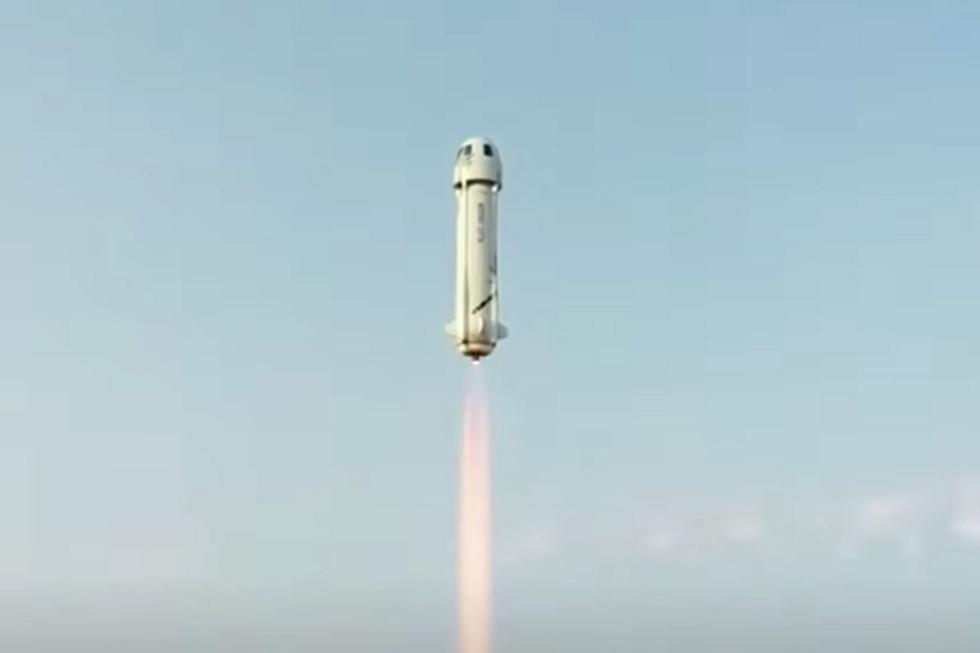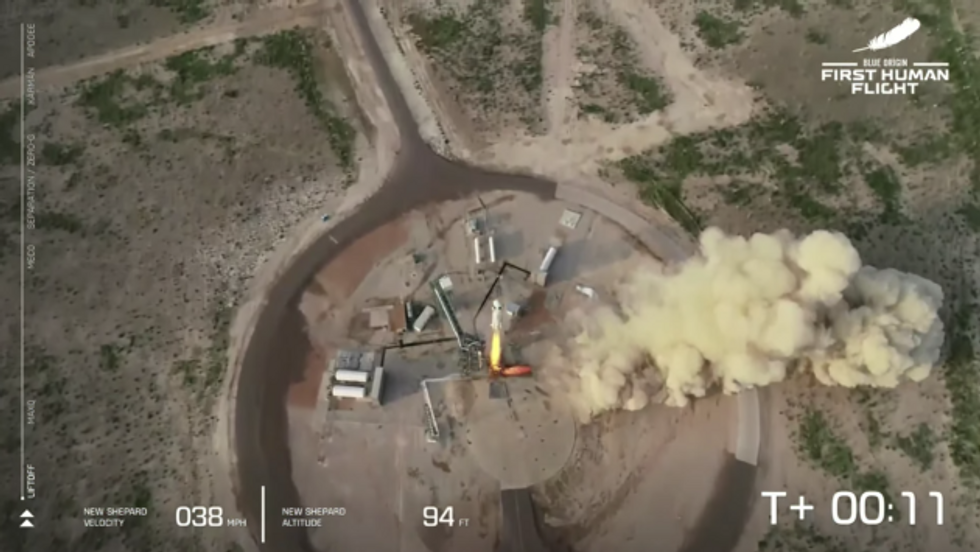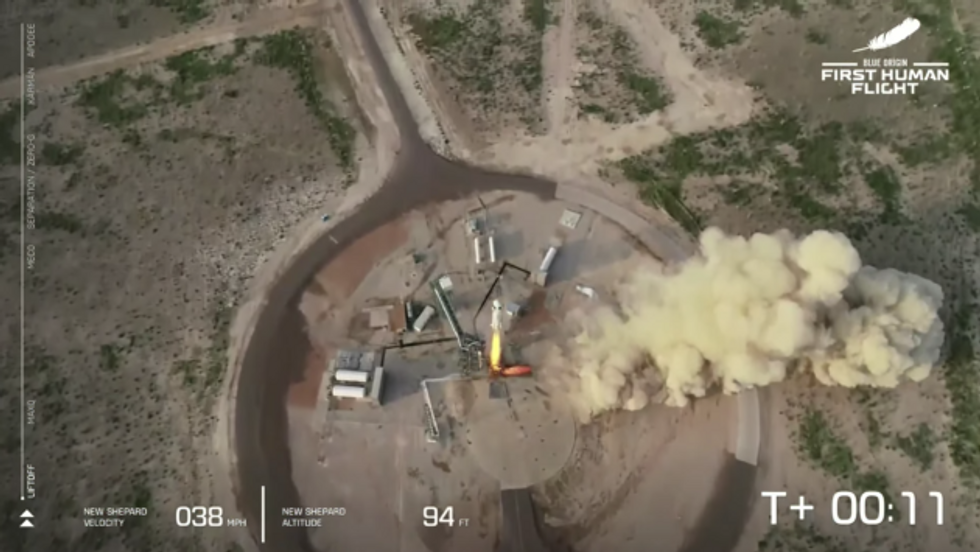VAN HORN, Texas — As of today, Jeff Bezos is not only the richest person on Earth. He's the richest person to fly to space as well.
The billionaire and three crewmates — including the world's oldest space traveler and the youngest — took an 11-minute ride on a reusable New Shepard rocket ship that was built by Blue Origin, the company created by Bezos in 2000.
"There's a very happy group of people in this capsule!" Bezos could be heard saying just after touchdown. "Best day ever!"
Today's flight marked the first time that people flew aboard New Shepard, which previously went through 15 uncrewed tests at Blue Origin's West Texas spaceport. The vehicle is designed to be flown autonomously, without a pilot at the controls.
Before the flight, Bezos said it was important for him to take a seat on the first crewed flight and demonstrate New Shepard's safety. "We know the vehicle is safe," he told CNN. "If it's not safe for me, then it's not safe for anyone."
In a historical flourish that's fitting for a man who paid to have the booster engines for NASA's Apollo moon missions retrieved from the bottom of the Atlantic, the milestone flight took place on the 52nd anniversary of the Apollo 11 moon landing. And speaking of flourishes, Jeff Bezos wore a cowboy hat and his lucky cowboy boots as he entered the capsule.
New Shepard's first crew also included an aviation pioneer who missed out on NASA's glory days: Wally Funk, a member of the "Mercury 13" group of women who were put through the same tests that the Mercury astronauts suffered through in the early 1960s but were never able to join the astronaut corps.
Funk, who's now 82, today displaced the late Mercury astronaut John Glenn from the most senior spot on the list of spacefliers. (Glenn was 77 when he flew on the shuttle Discovery in 1998 as a U.S. senator.)

Another record-setter on the crew is Oliver Daemen, an 18-year-old Dutch student who is now the world's youngest person to fly to space. (The late Soviet cosmonaut Gherman Titov, who followed Yuri Gagarin into orbit in 1961 at the age of 25, previously held the record.)
Daemen, the son of a Dutch investment company's CEO, had been planning to go on Blue Origin's second crewed flight. He was switched to the first crew when the winner of a $28 million auction asked to go on a later flight, reportedly due to a scheduling conflict.
Bezos also brought along his brother, Mark Bezos, an investor and volunteer firefighter whom the billionaire described as his best friend. Just before launch, capsule communicator Sarah Knights read out a message from the Bezos brothers' sister, Christina Bezos, who reminded Mark about the "Star Trek" games they used to play (with Jeff filling the Captain Kirk role).
"Mark, be prepared to fire those torpedoes if ordered to do so," Christina said.
Today's 11-minute mission was essentially a repeat of New Shepard's uncrewed test missions, starting with the ascent of the hydrogen-fueled booster from Blue Origin's Launch Site One. Less than three minutes after liftoff, the crew capsule separated from the booster and continued rising past the target altitude of 100 kilometers (62 miles).
The difference this time around is that there were actually four people on board to gaze out the capsule's jumbo-size windows, unstrap themselves from their seats and float around the cabin in zero gravity. Previous missions used a sensor-laden test dummy nicknamed Mannequin Skywalker.
While the booster guided itself to an autonomous landing on a pad at Launch Site One, the capsule decelerated and drifted down to the Texas desert at the end of its parachutes. Retro rockets fired just before touchdown, cushioning the impact and kicking up a cloud of dust. Soon afterward, Blue Origin's recovery team picked up the newly minted spacefliers.
The successful flight stands as one of the greatest achievements to date for Blue Origin, the company that Bezos founded in 2000 with the ultimate goal of having "millions of people living and working in space." During a string of TV interviews on the eve of the flight, Bezos insisted that Blue Origin was building a "road to space" that future generations could follow for the benefit of humanity.
In addition to the New Shepard program (named in honor of the late NASA astronaut Alan Shepard), Blue Origin is also developing an orbital-class rocket called New Glenn, and has been working with industry partners on a lunar landing system for NASA. Those programs have suffered setbacks, however, principally having to do with government contracts that were lost to SpaceX and United Launch Alliance.
In the suborbital spaceflight market, Blue Origin's biggest competitor is Virgin Galactic, which is nearing the end of the flight test program for its SpaceShipTwo rocket plane, dubbed VSS Unity. Virgin Galactic founder Richard Branson climbed aboard Unity for its most recent test flight last week, scoring a victory in the billionaire space race. However, Blue Origin beat Virgin Galactic to the punch today when it flew Daemens, the first suborbital space customer to use his ticket to fly.
If all proceeds according to plan, Blue Origin will fly its next crewed suborbital space mission in the September-October time frame, while Virgin Galactic will start taking on commercial passengers next year.
Tidbits from New Shepard's first crewed flight:
- Three of today's spacefarers used their last names as call signs, but because there were two Bezoses on board, Mark Bezos used the call sign "DEMO," which is an acronym created from the first names of his four children.
- Blue Origin used Rivian electric trucks to carry crew members to the launch pad and pick them up after landing. It's no coincidence that Amazon, the other company founded by Bezos, has invested in Rivian and ordered 100,000 Rivian electric vans for Amazon's delivery fleet.
This story first appeared on GeekWire.



